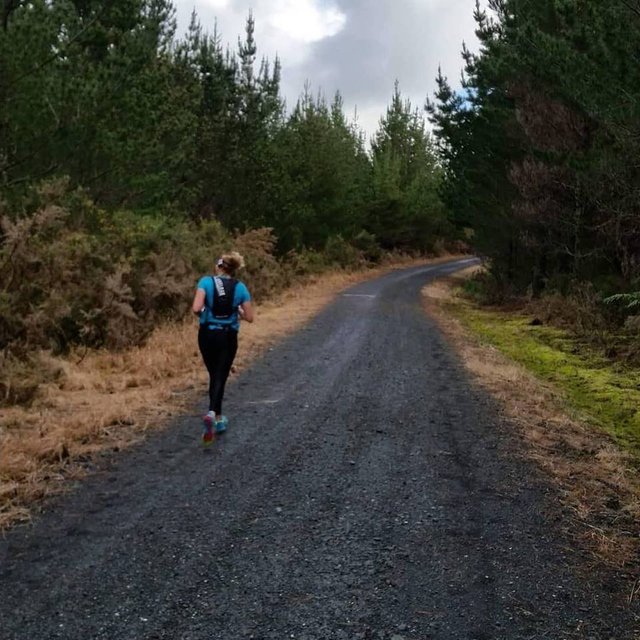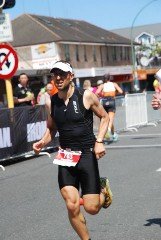Training For A Hill Running Ultra With The @runningproject

If you haven't heard, I'm mixing things up a bit and looking to run my first off road ultra run in October. I'll be taking on the Taupo Ultra run, which even though I am doing a 50km run, is actually one of the shorter races on the day. With that in mind, I've been doing a lot of reading to see how my training will need to change to meet the needs of doing something so different to what I usually do.
I know what your thinking, just run lots of hills in training! And you're right, but being someone from the Western Surburbs of Melbourne, I have not had a lot of practice at doing this, but now living in Auckland, there are a lot more chances to find hills to run. From what I know so far about this upcoming race, there are few things I will need to be concentrating on:
- The distance(50km)
- The climbing(Over 1800m)
- The decents(What goes up, will eventually come down)
- Running Offroad(The course is mostly trail or offroad)
Even though I'm training hard and consistently, with only two months to prepare, I thought it would be a good chance to discuss how I am looking to approach this training block and help you out with your next mountain/trail/ultra run.
Training For Distance
To be honest, this is one of the easier aspects of this run. Without focusing on a specific time and only wanting to finish the race, my approach to training for this will be pretty different to some of the other races I have run recently. I'll be running 5 times a week with most of my runs will be between 5km and 10km at varying speeds depending on how I feel, with my long run progressively getting longer as race day approaches. I have had a friend offer to show me the course in its entirity, which means I will be doing a 50km run in preparation for the race, but this will be both walking and running. My main priority will be getting confidence with the distance and making sure I am fully recovered through the week.
Training For Uphill
Knowing there will be close to 2000m of climbing for the race, I am pretty certain there is a lot of room for me to improve my uphill running. I have hills around me in Auckland and will be doing my best to encorporate them into my everyday running, especially on my long runs, but I know that a 50km run with big hills, there is going to be a point where they are going to slow me down. With tha in mind, I am using the following to help with the inevitable:
- Walking with purpose. Yep, I am positive there will be a point where I'll be walking, even in training, but I think I lot of people don't realise that if you are walking with purpose, at a brisk pace, using your arms and hands where you can to help push you legs down, you can still keep your momentumand not let it slow you down too much.
- I'll be using body weight exercises almost daily to help build extra strength. Some of the exercises I'll be using include squats, forward lunges, dead lifts and sideways lunges. I have set myself the goal of performing 1,800 body weight squats in the lead up to the race to help prepare me for the 1,800 meters in climbing I will be doing on race day.
Training For Downhill(This Is Really Important)
Running downhill for long periods of time will cause a lot of strain on your quadriceps muscles due to the constant breaking movements your legs will make when trying to decend. I Las Vegas earlier this year, I found out the hard way that if you do this for long periods of time, you'll no longer have any strength left to continue running, and of course thats something we don't want. So there are a few things I am trying to encorporate in my training to help limit to amount of strain on race day.
- When I get the chance to run downhill, I am trying to stop myself from slowing down and trying to run as lightly as possible.
- Actively performing strength based exercises 2 or 3 times a week to help strengthen my quadricep muscles. These include wall sits, extending the time that I am sitting, and Bulgarian Split Squats, which is basically a single leg squat with your back leg raised. I'll be trying to use my body weight and if that becomes too easy, I will try to add some weights.
Click on the link to see how to do a Bulgarian Split Squat
Training for Offroad
Rocks and uneven surfaces will play a bit part in my run. I am hoping that all my extra strength training will keep me as stable as possible on these difficult surfaces. One thing that has come as a surprise is the face thaat the soles of my feet are hurting when running over rocks and stones. I have proper trail running shoes, but need to work out how to toughen up the bottom of my feet ot allow the constant landings over the course of both training and racing. I am hoping the continued training on trails will help with this.
Recovering Like a Boss
We all know this one, and probably not something I should just be encorporating for this race, and I do use some of these methods to recover most of the time. I will admit I can always do more to help with my recovery. Aside from the usual foam roller, stretching, nutrition, sleep and regular Chiropractor sessions, I have thrown in one extra suppliment to help with recovery. I know this may cause a little controversary but I am going to say it anyway, because I think it's been helping. After my big training sessions I have been using KetoSwitch. This product is a Beta Hydroxybutyrate powder which is supposed to turn on Ketosis. I usually eat low carb, but would not consider myself to be in a state of ketosis, and have used these types of products before with no real benefit. But when I use it after a big training session, I am noticible feeling more awake and have more energy, and feel like I am recovering better. I feel like there is less muscle soreness after wards as well...Just something to keep in mind.
If you would like to know more about KetoSwitch, click on the link
If you'd like to follow along with my training and race, feel free to follow along on Strava:
https://www.strava.com/athletes/1778778

Now over two years ago, a pic of me running Ironman New Zealand
About the Author
Hey I'm Vince, an Aussie living in New Zealand, trying my best to make the most of the time I have. I work as a Software Engineer but love to run and all aspects of it, including geeking out on the latest science to help get the most out of my body.
For more information about @runningproject please see the latest status report:
https://steemit.com/runningproject/@runningproject/the-steem-running-project-9th-status-report-runningproject-has-reached-300-sp
If you have found this post useful or interesting, please consider Commenting, Upvoting, Following and/or Resteeming
Writen by @run.vince.run on behalf of the @runningproject

I think lots of runners are weak in the downhill.
If you do hill repeats then you could mix it up and take it a bit easier uphill and change the focus to the downhill.
The hill repeats could for example be:
Tempo pace up and race pace down
Agree. For trail running the most important workout are related to the downhill trainings.
Uphill can develop glutes and quadriceps in order to be 1' faster on uphill run but, knowing how to run fast on downhills makes the difference
No arguments(correction made) from my side. I think the thing that really caused issues for me was that I have never done very long distances downhill, until my race in Las Vegas, it showed me how weak I really was and glad I have that experience before doing my 50k.
Regards @run.vince.run
Good luck with your training @run.vince.run! I will look forward to seeing not only how the race goes, but also to see what you learn in your training. I agree with the other guys--the downhill strength is a big one! In addition to the things you mentioned, when I was training for my downhill half marathon at the beginning of the year I also threw in more plyometric drills for ankle stability and depth drops to help strengthen my quads for the beating. I'm sure you will do great!
As far as your recovery protocol, it's neat to see some different things like supplements and nutrition regimens that work for you. I'm solidly in the higher carb whole food camp, but there are all different options that work for different runners. I think it is good for you to share some of the things you might be doing for the other runners who might also benefit from similar things! Happy trails!
Thanks for that. You are right though, you need to find what is right for you, so I am a little hesitant in mentioning what I am doing with nutrition because some people are a little fixed in their thoughts and a little closed to anything that might be a little different to what they are normally doing.
Regards @run.vince.run
Oh yes, I have definitely dealt with my fair share of criticism as veganism is still a bit on the fringes (though getting more mainstream every day). I can unfortunately also say I have probably been too critical in the past in my opinion of different ideas, as well, so I have worked to be much more open to new things that may work for others. That's why I try to stay fairly general when I am writing up nutrition articles (as much as possible), because even though there are certain things that are pretty well set in stone for good nutrition (like eating whole, local, in season foods as much as possible) there are numerous ways to implement them in your own eating patterns!